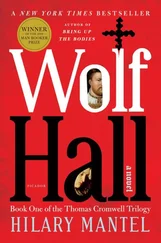‘Simple?’ he says. ‘Maid?’
George glares at him. ‘The cardinal never said that!’
‘Not at the time, I agree.’
‘Now I am Harry Percy again. “Though she be but a simple maid, her father a mere knight, yet her lineage is good –”’
‘She's some sort of cousin of the king's, isn't she?’
‘Some sort of cousin?’ Cavendish again breaks up his role, indignant. ‘My lord cardinal would have their descent unfolded before him, all drawn up by the heralds.’
‘So what shall I do?’
‘Just pretend! Now: her forebears are not without merit, young Percy argues. But the stronger the boy argues, the more my lord cardinal waxes into a temper. The boy says, we have made a contract of matrimony, which is as good as a true marriage …’
‘Does he? I mean, did he?’
‘Yes, that was the sense of it. Good as a true marriage.’
‘And what did my lord cardinal do there?’
‘He said, good God, boy, what are you telling me? If you have involved yourself in any such false proceeding, the king must hear of it. I shall send for your father, and between us we will contrive to annul this folly of yours.’
‘And Harry Percy said?’
‘Not much. He hung his head.’
‘I wonder the girl had any respect for him.’
‘She didn't. She liked his title.’
‘I see.’
‘So then his father came down from the north – will you be the earl, or will you be the boy?’
‘The boy. I know how to do it now.’
He jumps to his feet and imitates penitence. It seems they had a long talk in a long gallery, the earl and the cardinal; then they had a glass of wine. Something strong, it must have been. The earl stamped the length of the gallery, then sat down, Cavendish said, on a bench where the waiting-boys used to rest between orders. He called his heir to stand before him, and took him apart in front of the servants.
‘“Sir,”’ says Cavendish, ‘“thou hast always been a proud, presumptuous, disdainful and very unthrift waster.” So that was a good start, wasn't it?’
‘I like,’ he says, ‘the way you remember the exact words. Did you write them down at the time? Or do you use some licence?’
Cavendish looks sly. ‘No one exceeds your own powers of memory,’ he says. ‘My lord cardinal asks for an accounting of something or other, and you have all the figures at your fingertips.’
‘Perhaps I invent them.’
‘Oh, I don't think so.’ Cavendish is shocked. ‘You couldn't do that for long.’
‘It is a method of remembering. I learned it in Italy.’
‘There are people, in this household and elsewhere, who would give much to know the whole of what you learned in Italy.’
He nods. Of course they would. ‘But now, where were we? Harry Percy, who is as good as married, you say, to Lady Anne Boleyn, is standing before his father, and the father says …?’
‘That if he comes into the title, he would be the death of his noble house – he would be the last earl of Northumberland there ever was. And “Praise be to God,” he says, “I have more choice of boys …” And he stamped off. And the boy was left crying. He had his heart set on Lady Anne. But the cardinal married him to Mary Talbot, and now they're as miserable as dawn on Ash Wednesday. And the Lady Anne said – well, we all laughed at the time – she said that if she could work my lord cardinal any displeasure, she would do it. Can you think how we laughed? Some sallow chit, forgive me, a knight's daughter, to menace my lord cardinal! Her nose out of joint because she could not have an earl! But we could not know how she would rise and rise.’
He smiles.
‘So tell me,’ Cavendish says, ‘what did we do wrong? I'll tell you. All along, we were misled, the cardinal, young Harry Percy, his father, you, me – because when the king said, Mistress Anne is not to marry into Northumberland, I think, I think, the king had his eye cast on her, all that long time ago.’
‘While he was close with Mary, he was thinking about sister Anne?’
‘Yes, yes!’
‘I wonder,’ he says, ‘how it can be that, though all these people think they know the king's pleasure, the king finds himself at every turn impeded.’ At every turn, thwarted: maddened and baffled. The Lady Anne, whom he has chosen to amuse him, while the old wife is cast off and the new wife brought in, refuses to accommodate him at all. How can she refuse? Nobody knows.
Cavendish looks downcast because they have not continued the play. ‘You must be tired,’ he says.
‘No, I'm just thinking. How has my lord cardinal …’ Missed a trick, he wants to say. But that is not a respectful way to speak of a cardinal. He looks up. ‘Go on. What happened next?’
In May 1527, feeling embattled and bad-tempered, the cardinal opens a court of inquiry at York Place, to look into the validity of the king's marriage. It's a secret court; the queen is not required to appear, or even be represented; she's not even supposed to know, but all Europe knows. It is Henry who is ordered to appear, and produce the dispensation that allowed him to marry his brother's widow. He does so, and he is confident that the court will find the document defective in some way. Wolsey is prepared to say that the marriage is open to doubt. But he does not know, he tells Henry, what the legatine court can do for him, beyond this preparatory step; since Katherine, surely, is bound to appeal to Rome.
Six times (to the world's knowledge) Katherine and the king have lived in hope of an heir. ‘I remember the winter child,’ Wolsey says. ‘I suppose, Thomas, you would not be back in England then. The queen was taken unexpectedly with pains and the prince was born early, just at the turn of the year. When he was less than an hour old I held him in my arms, the sleet falling outside the windows, the chamber alive with firelight, the dark coming down by three o'clock, and the tracks of birds and beasts covered that night by the snow, every mark of the old world wiped out, and all our pain abolished. We called him the New Year's prince. We said he would be the richest, the most beautiful, the most devoted. The whole of London was lit up in celebration … He breathed fifty-two days, and I counted every one of them. I think that if he had lived, our king might have been – I do not say a better king, for that could hardly be – but a more contented Christian.’
The next child was a boy who died within an hour. In the year 1516 a daughter was born, the Princess Mary, small but vigorous. The year following, the queen miscarried a male child. Another small princess lived only a few days; her name would have been Elizabeth, after the king's own mother.
Sometimes, says the cardinal, the king speaks of his mother, Elizabeth Plantagenet, and tears stand in his eyes. She was, you know, a lady of great beauty and calm, so meek under the misfortunes God sent her. She and the old king were blessed with many children, and some of them died. But, says the king, my brother Arthur was born to my mother and father within a year of their marriage, and followed, in not too long a time, by another goodly son, which was me. So why have I been left, after twenty years, with one frail daughter whom any vagrant wind may destroy?
By now they are, this long-married couple, dragged down by the bewildered consciousness of sin. Perhaps, some people say, it would be a kindness to set them free? ‘I doubt Katherine will think so,’ the cardinal says. ‘If the queen has a sin laid on her conscience, believe me, she will shrive it. If it takes the next twenty years.’
What have I done? Henry demands of the cardinal. What have I done, what has she done, what have we done together? There is no answer the cardinal can make, even though his heart bleeds for his most benevolent prince; there is no answer he can make, and he detects something not entirely sincere in the question; he thinks, though he will not say so, except in a small room alone with his man of business, that no rational man could worship a God so simply vengeful, and he believes the king is a rational man. ‘Look at the examples before us,’ he says. ‘Dean Colet, that great scholar. Now he was one of twenty-two children, and the only one to live past infancy. Some would suggest that to invite such attrition from above, Sir Henry Colet and his wife must have been monsters of iniquity, infamous through Christendom. But in fact, Sir Henry was Lord Mayor of London –’
Читать дальше












